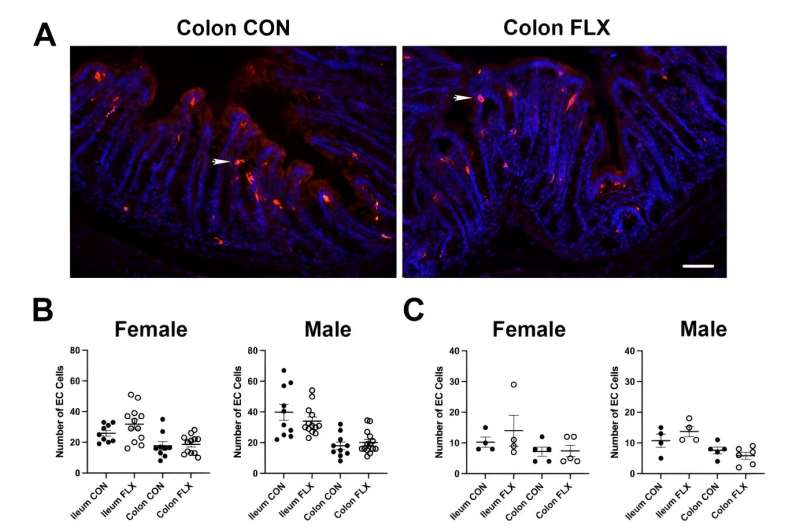This article has been reviewed according to Science X's editorial process and policies. Editors have highlighted the following attributes while ensuring the content's credibility:
fact-checked
trusted source
proofread
Antidepressants taken during pregnancy may affect children's digestive health

A new study finds that a commonly prescribed class of antidepressant drugs taken during pregnancy may affect digestive health in offspring later in life. The study is published ahead of print in the American Journal of Physiology-Gastrointestinal and Liver Physiology.
An estimated 10% of people use antidepressants during pregnancy. Selective serotonin reuptake inhibitors (SSRIs) are the most common type of antidepressant medications used during pregnancy and breastfeeding. However, use of SSRIs has been found to double the risk of congenital birth defects and has a lasting effect on children's language skills and gastrointestinal function.
This may be because 95% of the body's serotonin—a chemical messenger that facilitates communication between the nervous system and the brain as well as enhances mood—is found in the gastrointestinal tract.
In this study, researchers used a rat model to explore whether exposure to the SSRI drug fluoxetine affected the offsprings' gastrointestinal motility—how food moves the digestive system—and risk for developing colitis. Two groups of female rats were given cookie dough for two weeks before mating through when they weaned the rat pups at three weeks old.
One group received fluoxetine in their treat, while the other group consisted of nonmedicated controls. This medication schedule "reflects real-world use of antidepressant therapy during pregnancy and lactation," the researchers wrote.
The research team looked at tissue samples from the offsprings' gastrointestinal tract as well as gene expression, intestinal motility and susceptibility for developing colitis at birth, at weaning and at six months of age. They found the levels of nerve cells that regulate the gastrointestinal (enteric) nervous system and coordinate motility were significantly increased in the offspring from medicated mothers at the height of drug exposure, which coincided with weaning. Serotonin signaling in the male offspring was altered as well.
Signaling in the female offspring remained stable, but the females born to medicated mothers showed more frequent contractions of the colon compared to the control group. "These findings have the potential to be relevant to [irritable bowel syndrome], in which sex-dependent difference have also been noted," the researchers wrote.
The researchers did not find an increased risk for colitis in the rats born to medicated mothers. However, they noted that "further clinical studies to better understand the relationship between [fluoxetine] exposure in utero and potential disease risk are thus of importance."
More information: Katherine L. Prowse et al, Effects of in utero exposure to fluoxetine on the gastrointestinal tract of rat offspring, American Journal of Physiology-Gastrointestinal and Liver Physiology (2023). DOI: 10.1152/ajpgi.00223.2022




















